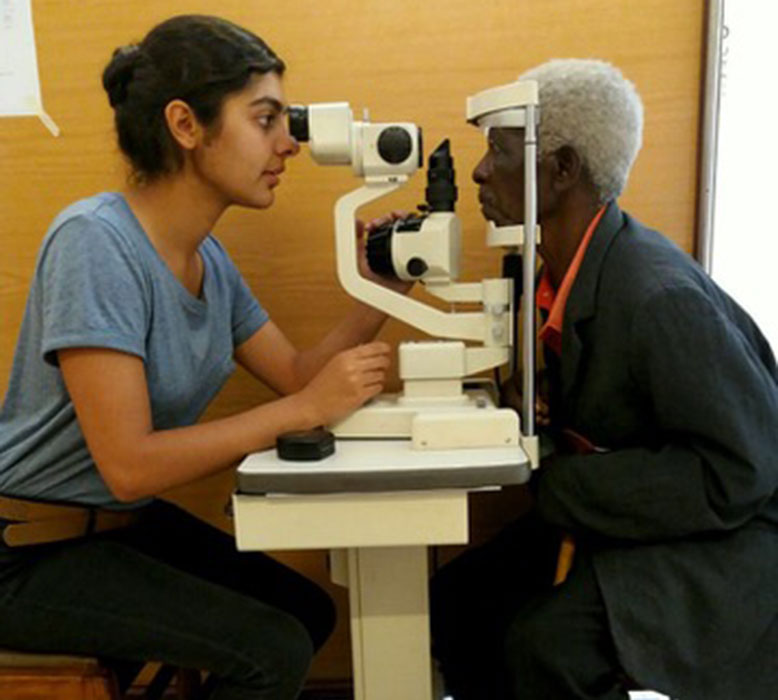- OT
- Life in practice
- Practitioner stories
- Malawi mission
Malawi mission
Cardiff University optometry undergraduates, Annabelle Gorham and Krishna Pattni, share their experiences volunteering in Malawi this summer

23 October 2017
During the summer, 12 optometry students from Cardiff University travelled to Malawi on an outreach project aiming to deliver free eye care to isolated towns and villages throughout the country.
Split into two teams of six, one group was based in the country’s capital, Lilongwe, at the College of Health Sciences, and the other was in Blantyre, the second largest city in Malawi.
In order for the project to take place, we were required to fundraise £9000 as a team. This money then went towards the purchase of the spectacles that we dispensed, as well as safe accommodation and travel during the project.
Although we were lucky enough to get sponsorship from companies such as Specsavers, Hoya and several local rotary clubs, we also fundraised as a team in order to achieve our fundraising target.
"This was an experience that will stay with us for the rest of our lives...it was also incredibly rewarding. We would definitely recommend the experience to anyone who has a similar opportunity"
Malawi need
According to the World Bank, Malawi is the poorest country in the world. For a population of around 15 million people, there are currently nine consultant ophthalmologists. Due to this, attaining eye care can be a challenge, particularly in more remote areas.
As a team, we aimed to test the sight of around 2000 local people and dispense spectacles to those who required them, as well as screen for patients who were in need of cataract operations.
In order to maximise the number of patients being screened for cataract throughout the country, the group of students who were based in Blantyre was further split for a week of the trip.
While four members of the team stayed in Blantyre, the others travelled further afield to screen in remote areas.
Those who remained in Blantyre were to teach refraction to the ophthalmology students in Lions Hospital, and observe in the out-patients’ department and surgeries in theatre.
One case that they recall in the refraction department was that of a three-year-old boy who had an alternating exotropia, nystagmus and aphakic in one eye, and congenital glaucoma in the other.
After a failed attempt at retinoscopy by the hospital optometrists, the child was referred to the outpatients’ department and then for surgery. This patient was of particular interest to us, as we had not yet observed any paediatric patients with such serious problems.
Most conditions that were present in the outpatients’ department were at a severe stage of progression. An example of this was a patient with end stage endophthalmitis where by enucleation was required in order to prevent infection spreading through the optic nerve and to their brain.
Spending time in Lions Hospital certainly made all of the students appreciate the high quality of health care that is available in the UK.

A team of two halves
The team based in Lilongwe spent two weeks in Malawi’s College of Health Sciences teaching third year optometry students.
Lessons covered dispensing, refraction, binocular vision and contact lenses. However, contact lenses were covered more as a point of interest rather than a skill that students would be practically using in Malawi.
Whilst at the university, the team took part in multiple outreach projects to rural villages where cataract screening and refraction took place. The students in the group found it extremely satisfying to see how the teaching improved the students’ techniques and ultimately led to the patient experience being improved.
The refraction clinics were a very different layout to the clean, clinical setting we are used to at university. We were forced to be flexible about where we were testing and the quality of equipment we were using – our reading charts were often on the back of a cereal box or a pack of blue tack.
There were days that clinics were extremely chaotic, with hundreds of patients queueing with little order. Many of the makeshift testing areas and benches were also so unstable that equipment would occasionally go flying.
We quickly found that hand gestures and body language were more useful than trying to communicate through spoken word. Most of the patients could speak little to no English, and translators were sparse. We valued the experience of having to test so many patients where communication was not easy as we knew this skill would help us throughout our careers.
Unfortunately, in a lot of cases we were out of depth for the skills that we have as student optometrists and the resources that were available to us. Often all we could suggest was to go to the nearest hospital for treatment. In some of the remote villages, with a lack of transport, this would be extremely difficult.
As clinicians, this was very frustrating, particularly when we knew that in the UK some of the cases could have easily been solved, saving the sight or discomfort of the patients.
All in all, this was an experience that will stay with us for the rest of our lives. Although it was challenging testing more patients in four weeks than we had in two years of studying optometry, it was also incredibly rewarding. We would definitely recommend the experience to anyone who has a similar opportunity.
Advertisement


Comments (0)
You must be logged in to join the discussion. Log in